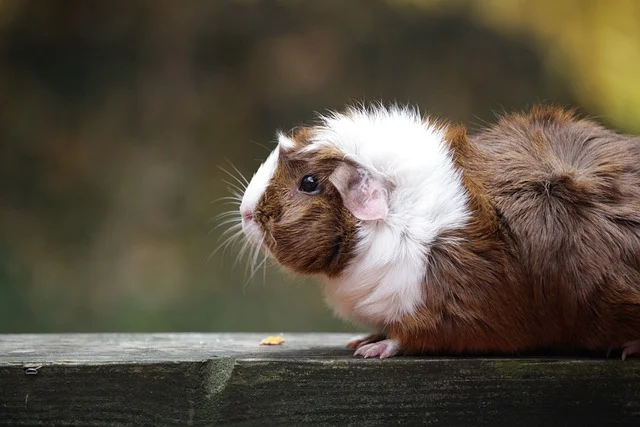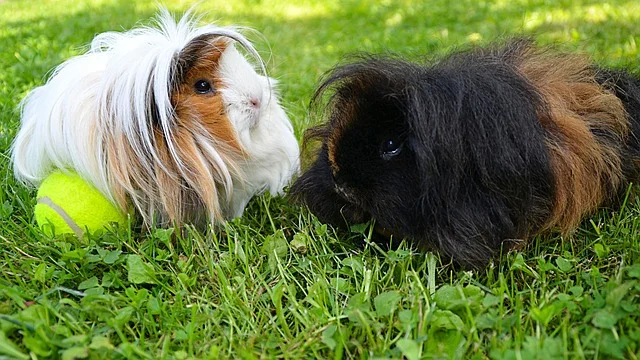Guinea pigs, also known as cavies, are adorable and sociable pets that make great companions. They come in various types, each with unique characteristics and care requirements. In this comprehensive guide, we will explore different aspects of guinea pig ownership, including their types, care tips, breeding considerations, food habits, social habits, and vaccines. Whether you’re a first-time guinea pig owner or looking to expand your knowledge, this article will provide you with valuable insights and information.
Guinea pigs are small, herbivorous rodents native to the Andes region of South America. They have been domesticated for hundreds of years and are popular pets worldwide. These charming creatures have a friendly and docile nature, making them ideal for families and individuals of all ages. Ready to dive into the world of guinea pigs? Let’s get started!
Types of Guinea Pigs
Guinea pigs come in a variety of types, each exhibiting distinct characteristics. Some common types include:
- Abyssinian
- Peruvian
- American
- Silkie (Sheltie)
- Teddy
- Skinny
- Baldwin
- Texel
- Coronet
- Lunkarya
- Sheba
- Merino
- White Crested
Abyssinian Guinea Pig

The Abyssinian guinea pig is a fascinating and popular breed known for its distinctive appearance and lively personality. Here are some key points about this breed:
Appearance of Abyssinian Guinea Pig
- Rosettes: Abyssinian guinea pigs are easily recognizable by their unique coat, which features rough, spiky hair arranged in rosettes. They typically have 6-8 rosettes spread across their bodies.
- Colors: They come in a variety of colors, including albino, agouti, dalmatian, and tortoiseshell.
The personality of Abyssinian Guinea Pig
- Active and Outgoing: Abyssinians are more active and outgoing compared to other guinea pig breeds. They are known for their bold and quirky personalities, making them great pets for families.
- Sociable: These guinea pigs are very sociable and enjoy the company of other guinea pigs and humans. They are affectionate and respond well to interaction and training.
Abyssinian Guinea Pig Care Requirements
- Grooming: Despite their rough coat, Abyssinians are relatively low-maintenance. Regular brushing helps keep their coat in good condition, and occasional nail trimming is necessary.
- Diet: Like all guinea pigs, they require a diet rich in hay, fresh vegetables, and a small amount of guinea pig pellets. Vitamin C is essential as guinea pigs cannot produce it on their own.
Origin
- History: The exact origin of the Abyssinian guinea pig’s name is unclear, but they have been popular pets since they were first brought to England in the 16th century. They are one of the oldest guinea pig breeds.
Why Choose an Abyssinian?
- Great Companions: Their lively and friendly nature makes them ideal companions for both children and adults. They thrive on attention and enjoy being part of the family.
If you’re considering an Abyssinian guinea pig, you’ll find them to be delightful and engaging pets that bring a lot of joy and activity into your home.
Peruvian Guinea Pig

The Peruvian guinea pig is a captivating breed known for its exceptionally long and silky fur. Here are some key details about this breed:
Appearance of Peruvian Guinea Pigs
- Long Hair: Peruvian guinea pigs are distinguished by their long, flowing hair, which can grow up to 20 inches (50 cm) in length. Their coats are soft, silky, and dense, often requiring regular grooming to maintain.
- Colors: They come in various colors, including tri-colored, white, brown, russet, and gray.
Personality of Peruvian Guinea Pigs
- Curious and Playful: Peruvians are known for their curious and playful nature. They are alert and enjoy exploring their surroundings.
- Affectionate: These guinea pigs are affectionate and enjoy cuddling with their owners. They have a friendly demeanor and can form strong bonds with their human companions.
Peruvian Guinea Pigs Care Requirements
- Grooming: Due to their long hair, Peruvian guinea pigs require more grooming than other breeds. Regular brushing is essential to prevent tangles and matting.
- Diet: Their diet should include plenty of hay, fresh vegetables, and a small amount of guinea pig pellets. Vitamin C is crucial as they cannot produce it on their own.
- Exercise: They need ample space to move around and explore. Providing toys and tunnels can help keep them active and engaged.
Peruvian Guinea Pigs Origin
- History: The Peruvian guinea pig is one of the oldest breeds, originating from the Andes mountains in Peru. They were initially bred as show animals due to their striking appearance.
Why Choose a Peruvian?
- Show Quality: Their long, beautiful hair makes them popular in guinea pig shows. They are often chosen by breeders and enthusiasts for their unique appearance.
- Engaging Pets: Their playful and affectionate nature makes them delightful pets for those who can commit to their grooming needs.
If you’re considering a Peruvian guinea pig, be prepared for the extra grooming they require, but you’ll be rewarded with a charming and engaging companion.
Short-haired Guinea Pig
Short-haired guinea pigs are popular pets due to their easy maintenance and friendly nature. Here are some key details about them:
American Guinea Pig
- Appearance: The American guinea pig, also known as the American Shorthair, has a smooth, short coat that requires minimal grooming. They have a round body with broad shoulders and a sleek appearance.
- Personality: They are known for their sweet and docile temperament, making them ideal pets for families and children. They are naturally passive and get along well with other guinea pigs.
- Care: Their short coat means they need only occasional brushing to keep their fur clean and free of debris. They are low-maintenance compared to long-haired breeds.
English Crested Guinea Pig
- Appearance: This breed has a short, smooth coat similar to the American guinea pig but with a distinctive crest of hair on their forehead.
- Personality: English Crested guinea pigs are friendly and enjoy human interaction. They are generally calm and easy to handle.
- Care: Like the American guinea pig, they require minimal grooming. Regular brushing helps keep their coat in good condition.
Teddy Guinea Pig
- Appearance: Teddy guinea pigs have a short, dense, and springy coat that gives them a plush, teddy bear-like appearance.
- Personality: They are friendly and easy to handle, making them great pets for children and first-time guinea pig owners.
- Care: Their coat requires minimal grooming, but regular brushing helps maintain its texture and cleanliness.
Rex Guinea Pig
- Appearance: Rex guinea pigs have a short, dense, and curly coat that feels coarse to the touch. They have a unique, plush appearance.
- Personality: They are known for their calm and gentle nature. Rex guinea pigs are affectionate and enjoy being handled.
- Care: Their coat requires minimal grooming, but regular brushing helps keep it free of tangles and debris.
Why Choose a Short-haired Guinea Pig?
- Low Maintenance: Short-haired guinea pigs are easier to care for compared to long-haired breeds, making them ideal for busy individuals or families.
- Friendly Nature: They are generally friendly, and docile, and enjoy human interaction, making them great companions.
- Variety: There are several short-haired breeds to choose from, each with its unique characteristics and charm.
Short-haired guinea pigs are excellent pets for those looking for a low-maintenance, friendly, and engaging companion.
Long haired Guinea Pig
Long haired guinea pigs are known for their beautiful, flowing coats that require extra care and attention. Here are some of the most popular long haired guinea pig breeds and their characteristics:
Peruvian Guinea Pig
- Appearance: They have long, silky hair that can grow up to 20 inches (50 cm). Their hair often covers their eyes and requires regular grooming to prevent tangles.
- Personality: Curious and playful, they enjoy exploring their surroundings and interacting with their owners.
- Care: Regular brushing and occasional trimming are necessary to maintain their coat.
Silkie (Sheltie) Guinea Pig
- Appearance: Silkies have long, smooth hair that flows backward from their head, giving them a sleek appearance.
- Personality: Gentle and easygoing, they are known for their calm demeanor.
- Care: Their hair requires regular grooming to keep it free of tangles and matting.
Texel Guinea Pig
- Appearance: Texels have long, curly hair that gives them a unique, plush look.
- Personality: Friendly and affectionate, they enjoy being handled and cuddled.
- Care: Regular grooming is essential to prevent their curls from becoming matted.
Coronet Guinea Pig
- Appearance: Coronets have long hair similar to Silkies but with a distinctive crest of hair on their forehead.
- Personality: Affectionate and gentle, they are great companions for both children and adults.
- Care: Regular brushing and occasional trimming are needed to maintain their coat.
Lunkarya Guinea Pig
- Appearance: Lunkaryas have thick, long, and curly hair. They come in three variations: Peruvian (long hair with a prominent front section), Sheltie (long hair that flows backward), and Coronet (long hair with a crest on the forehead).
- Personality: Sociable and friendly, they enjoy interacting with their owners and other guinea pigs.
- Care: Their thick, curly hair requires frequent grooming to prevent tangles and matting.
Alpaca Guinea Pig
- Appearance: Alpacas have long, curly hair with rosettes, giving them a tousled look.
- Personality: Playful and curious, they are active and enjoy exploring.
- Care: Regular grooming is necessary to keep their coat in good condition.
Merino Guinea Pig
- Appearance: Merinos have long, curly hair similar to Texels but with a crest on their forehead.
- Personality: Calm and friendly, they are known for their gentle nature.
- Care: Regular brushing and occasional trimming are needed to maintain their curls.
Why Choose a Long-haired Guinea Pig?
- Unique Appearance: Their long, beautiful coats make them stand out, and are often a favorite among pet enthusiasts.
- Engaging Personalities: Many long-haired breeds are known for their friendly and affectionate nature, making them great companions.
- Show Potential: Their striking appearance makes them popular in guinea pig shows and competitions.
Long-haired guinea pigs are wonderful pets for those who can commit to their grooming needs. They bring a lot of joy and beauty into a home.
Texel Guinea Pig
The Texel guinea pig is a unique and charming breed known for its distinctive curly coat and friendly nature. Here are some key details about this breed:
Appearance of Texel Guinea Pig
- Curly Coat: Texel guinea pigs have long, curly hair that sets them apart from other breeds. Their coat is dense and requires regular grooming to prevent tangles and matting.
- Size: They are relatively small, typically weighing between 1.5 to 2.5 pounds and measuring 8 to 10 inches in length.
- Colors: Texels come in a variety of colors, including white, gold, black, and brown, as well as combinations of these colors.
Texel Guinea Pig Personality
- Friendly and Affectionate: Texels are known for their gentle and affectionate nature. They enjoy human interaction and are generally calm and easy to handle.
- Vocal: They tend to be more vocal than other guinea pig breeds, often communicating with their owners through a range of sounds.
- Social: Texels thrive on social interaction and do well when housed with other guinea pigs.
Texel Guinea Pig Care Requirements
- Grooming: Due to their long, curly hair, Texels require regular grooming. This includes brushing to prevent tangles and matting, as well as occasional trimming.
- Diet: Their diet should consist of high-quality guinea pig pellets, fresh vegetables, and plenty of hay. Vitamin C is essential as guinea pigs cannot produce it on their own.
- Enclosure: They need a spacious enclosure to move around and explore. A minimum of 4 square feet per guinea pig is recommended.
Origin and History of Texel Guinea Pig
- Development: The Texel guinea pig is a relatively new breed, developed in the 1980s by crossing a Silkie guinea pig with a British Rex. They were officially recognized by the American Cavy Breeders Association in 1988.
- Popularity: Despite being a newer breed, Texels have quickly gained popularity due to their unique appearance and friendly temperament.
Why Choose a Texel?
- Unique Appearance: Their curly coat makes them stand out and is a favorite among guinea pig enthusiasts.
- Affectionate Nature: They are known for their loving and gentle demeanor, making them great companions.
- Show Potential: Their striking appearance makes them popular in guinea pig shows and competitions.
Texel guinea pigs are wonderful pets for those who can commit to their grooming needs. They bring a lot of joy and beauty into a home.
Choosing the Right Guinea Pig
Choosing the right guinea pig involves considering several factors to ensure you find a pet that fits well with your lifestyle and preferences. Here are some key points to help you make an informed decision:
- Breed Characteristics
Different breeds have unique characteristics, including coat type, grooming needs, and personality traits. Here are a few examples:
- American: Short-haired, low maintenance, and friendly.
- Abyssinian: Rosetted coat, active, and outgoing.
- Peruvian: Long-haired, requires regular grooming, curious and playful.
- Texel: Long, curly hair, friendly, and affectionate.
2. Gender
- Males (Boars): Generally larger and can be more territorial, especially with other males. They may require more space and attention to prevent conflicts.
- Females (Sows): Typically more social and less territorial. They can live peacefully in groups and are often easier to manage in terms of behavior.
3. Age
- Young Guinea Pigs: Easier to train and bond with, but require more time and patience.
- Adult Guinea Pigs: May already be socialized and trained, making them easier to care for initially.
4. Health and Appearance
When selecting a guinea pig, look for signs of good health:
- Eyes: Should be bright and clear, without discharge.
- Coat: Should be clean, shiny, and free of bald patches or lumps.
- Behavior: Should be active and alert, with no signs of lethargy or distress.
5. Source
- Breeders: Offer specific breeds and can provide detailed information about the guinea pig’s background and health.
- Shelters/Rescues: Great option for adopting guinea pigs in need of a home. You may find a variety of breeds and ages available.
6. Compatibility
If you already have guinea pigs, consider their compatibility with a new addition. Guinea pigs are social animals and generally do well in pairs or small groups, but introductions should be done carefully to ensure they get along.
7. Lifestyle and Commitment
- Time: Guinea pigs require daily care, including feeding, cleaning, and social interaction.
- Space: Ensure you have enough space for a suitable enclosure that allows for exercise and exploration.
- Budget: Consider the costs of food, bedding, veterinary care, and other supplies.
Why Choose a Guinea Pig?
- Companionship: They are social and affectionate pets that enjoy interaction with their owners.
- Low Maintenance: Compared to larger pets, guinea pigs are relatively low maintenance, especially short-haired breeds.
- Educational: They can be great pets for children, teaching responsibility and empathy.
Choosing the right guinea pig can lead to a rewarding and joyful pet ownership experience.
Creating a Suitable Habitat
Providing a suitable habitat is crucial for your guinea pig’s well-being. Prepare a spacious cage with appropriate bedding, such as paper-based bedding or fleece liners. Include hideouts, tunnels, and chew toys to stimulate their instincts. Place the cage in a quiet area away from direct sunlight and drafts.
Feeding and Nutrition
A balanced diet is essential for your guinea pig’s health. Offer a variety of fresh vegetables, such as leafy greens, bell peppers, and carrots. Provide high-quality guinea pig pellets as a staple food source, ensuring they contain essential nutrients like Vitamin C. Fresh hay should be available at all times to aid digestion and maintain dental health.
Maintaining Good Health
Regular veterinary check-ups are vital to ensure your guinea pig’s well-being. Monitor their weight, teeth, and overall behavior. Keep their living environment clean to prevent the onset of diseases and infections. Provide ample opportunities for exercise to keep them physically active.
Handling and Socializing
Guinea pigs are social animals that enjoy companionship. Interact with your guinea pig daily, gently picking them up and holding them close to your body. Ensure a safe and secure environment when allowing them to explore outside their cage. Consider adopting a pair of guinea pigs to provide each other with the company.
Breeding Guinea Pigs
Breeding guinea pig should be undertaken responsibly and with proper knowledge. Ensure you have enough space, time, and resources to care for the offspring. It’s vital to avoid inbreeding and maintain genetic diversity within guinea pig populations.
Common Guinea Pig Health Issues
Guinea pigs can be susceptible to certain health issues. Keep an eye out for signs of respiratory problems, dental issues, parasites, and gastrointestinal disorders. Prompt veterinary attention is necessary if you notice any abnormalities in your guinea pig’s behavior, appetite, or appearance.
Vaccinations for Guinea Pigs
Vaccinations are essential for protecting your guinea pig against certain diseases. Consult with a knowledgeable veterinarian to determine the appropriate vaccination schedule for your pet. Common vaccinations for guinea pigs include protection against respiratory infections and scurvy.
Conclusion
Guinea pigs are delightful pets that bring joy and companionship to many households. By understanding their types, providing proper care, considering their food and social habits, and ensuring they receive necessary vaccinations, you can create a healthy and enriching environment for your guinea pig. Remember to prioritize their well-being and enjoy the rewarding experience of being a guinea pig owner. Cherish every moment with your furry friend and watch as they thrive in your loving care.
Frequently Asked Questions (FAQs)
How long do guinea pigs live?
On average, guinea pigs live between 5 and 7 years, but with proper care, some can live even longer.
Can guinea pigs be kept outdoors?
Guinea pigs are susceptible to extreme temperatures, so it’s generally best to keep them indoors. However, they can enjoy supervised outdoor time in a secure and shaded area.
Do guinea pigs require baths?
Guinea pigs are generally clean animals and groom themselves. However, occasional baths may be necessary if they become soiled or have certain skin conditions. Use specially formulated guinea pig shampoo and ensure the water is lukewarm.
Can guinea pigs eat fruits?
Yes, guinea pigs can enjoy a variety of fruits as occasional treats. However, some fruits are high in sugar and should be given sparingly to prevent digestive issues.
Do guinea pigs need companionship?
Guinea pigs are social animals and thrive in the company of their kind. Consider adopting a pair or providing ample social interaction to ensure their well-being.






